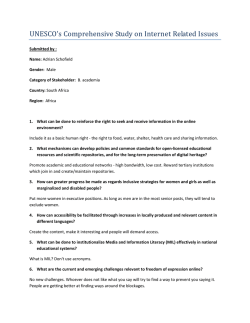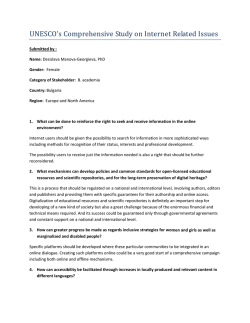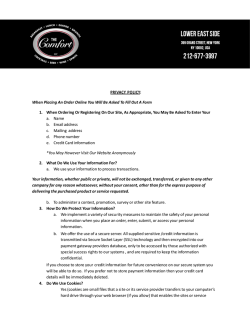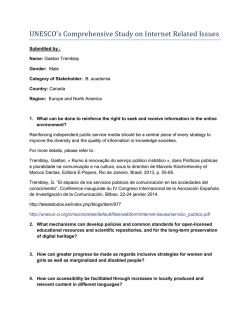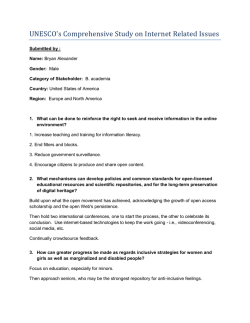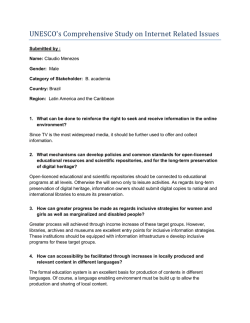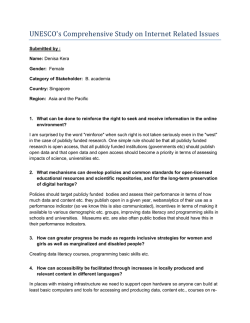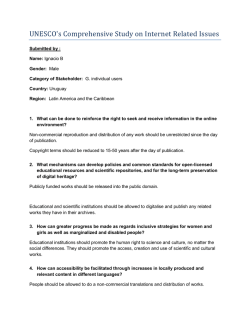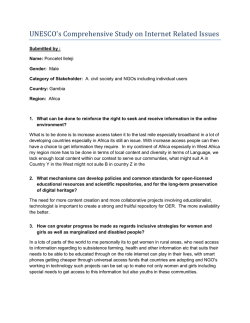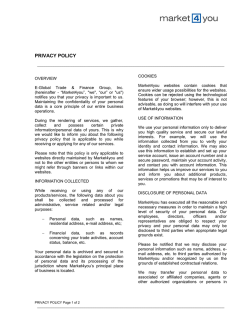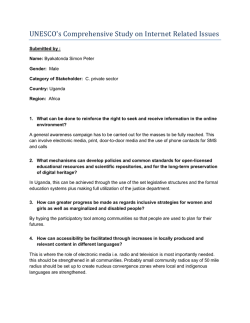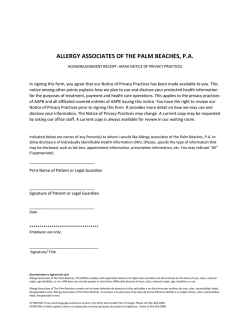
Olusola Oyero
UNESCO'sComprehensiveStudyonInternetRelatedIssues Submitted by : Name: Olusola Oyero Gender: Male Category of Stakeholder: B. academia Country: Nigeria Region: Africa 1. What can be done to reinforce the right to seek and receive information in the online environment? Provision of greater access in terms of the facilities such as cheaper laptops, mobile phones, bandwidths, electricity for developing countries like Nigeria, and enlightenment, etc. 2. What mechanisms can develop policies and common standards for open‐licensed educational resources and scientific repositories, and for the long‐term preservation of digital heritage? Fora and conventions to arrive at appropriate policies. 3. How can greater progress be made as regards inclusive strategies for women and girls as well as marginalized and disabled people? There is need for more advocacy, education and enabling environment. 4. How can accessibility be facilitated through increases in locally produced and relevant content in different languages? Training and funding for digitization. 5. What can be done to institutionalize Media and Information Literacy (MIL) effectively in national educational systems? Departments of Education should be so educated and higher educational institutions should be encouraged and supported to include it in their curricula since they are free in their curriculum development. 6. What are the current and emerging challenges relevant to freedom of expression online? The problem of access Restrictive legislation 7. How can legislation in a diverse range of fields which impacts on the Internet respect freedom of expression in line with international standards? Lobbying the legislative arms of government for greater freedom. 8. Is there a need for specific protections for freedom of expression for the Internet? Yes, authoritarian governments persecute persons for online posts perceived as offensive. 9. To what extent do laws protect digitally interfaced journalism and journalistic sources? It depends on the locations, in some places the law does not offer any protection. 10. What are the optimum ways to deal with online hate speech? How can Media and Information Literacy empower users to understand and exercise freedom of expression on the Internet? This is quite difficult. One way is to disallow hate speeches from being published but that will again result into restriction. People simply need to be educated to behave more maturely. 11. What are the optimum systems for independent self‐regulation by journalistic actors and intermediaries in cyberspace? Code of ethics should outlined and people enjoined to practice them. 12. What principles should ensure respect for the right to privacy? This again is difficult because it depends on the issue involved and the person concerned. 13. What is the relationship between privacy, anonymity and encryption? 14. What is the importance of transparency around limitations of privacy? When people don't have skeleton in their cupboad, fear of intrusion into their privacy will be limited. 15. What kinds of arrangements can help to safeguard the exercise of privacy in relation to other rights? What is the issue? Is it in the interest of the pubic? How does it affect the national life? 16. How can openness and transparency of data be reconciled with privacy? Again it depends on how the issue affect the public. 17. What may be the impact of issues relating to big data on respect for privacy? 18. How can security of personal data be enhanced? Greater security system to ensure it. 19. How can Media and Information Literacy be developed to assist individuals to protect their privacy? Through education and enlightenment 20. How can ethical principles based on international human rights advance accessibility, openness, and multi‐stakeholder participation on the Internet? Sharing the details, its importance and mobilization for its acceptance. 21. What conceptual frameworks or processes of inquiry could serve to analyse, assess, and thereby inform the choices that confront stakeholders in the new social uses and applications of information and knowledge? There is no single framework, all available options must be considered. 22. How does ethical consideration relate to gender dimensions of the Internet? Equity is the word. There should be equal opportunities. 23. How can ethics, ‐ i.e. the simultaneous affirmation of human rights, peace, equity, and justice ‐ inform law and regulation about the Internet? Any law or regulation that run counter should be resisted. 24. What international, regional and national frameworks, normative guidelines and accountability mechanisms exist of relevance to one or more fields of the study? 25. How do cross‐jurisdictional issues operate with regard to freedom of expression and privacy? 26. What are the intersections between the fields of study: for example, between access and freedom of expression; ethics and privacy; privacy and freedom of expression; and between all four elements? 27. What pertinent information materials exist that cut across or which are relevant to the four fields of the study? 28. What might be the options for role of UNESCO within the wider UN system in regard to the distinct issues of online Access to information and knowledge, Freedom of Expression, Privacy and Ethical dimensions of the information society? 29. What might be options for the role of UNESCO in relation to stakeholders outside the UN system? 30. For each study field, what specific options might UNESCO Member States consider?
© Copyright 2026
